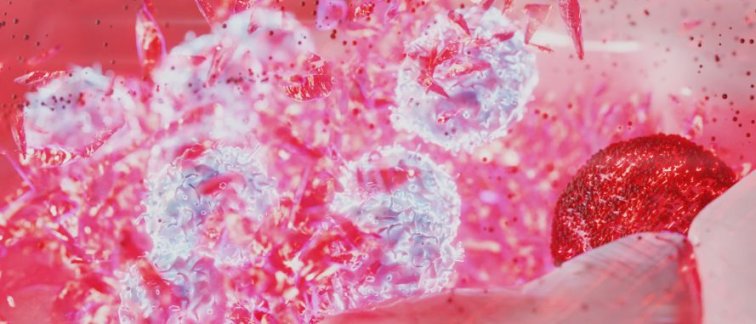Vimentin is a protein that has a structural role in the cytoskeleton of undifferentiated (mesenchymal) cells. In 2006, Arjan Griffioen, Professor of Experimental Oncology and Angiogenesis, and his team discovered that vimentin was overexpressed in the blood vessels of tumors. Ever since, his research team has been investigating why: what is the function of vimentin in tumor vasculature?
Recent studies have found that vimentin is also secreted by tumor-associated endothelial cells. In this Nature Communications publication, Prof. Griffioen and his team report that extracellular vimentin supports the growth of tumor vasculature and directly contributes to an immunosuppressive tumor microenvironment.
Helping cancer grow
“We found that this protein promotes the formation of new blood vessels in a tumor," explains Prof. Griffioen. New blood vessels ‘feed’ tumors and help them grow, a process called angiogenesis.
“We also discovered that extracellular vimentin was doing something else: it shields the tumor blood vessels from effective leukocyte infiltration. Both the promotion of angiogenesis and immune system suppression allow tumors to grow and spread faster.”
Clinical translation of a fundamental discovery
Since extracellular vimentin is expressed only in tumor-associated vasculature and has a pivotal role in the growth of cancer, could a therapy targeting it effectively inhibit tumor growth? To find out, Griffioen’s team developed several antibody-based immunotherapies against extracellular vimentin.
Prof. Griffioen: "In our Nature Communication paper, we show that both passive and active antibody-based immunotherapies against extracellular vimentin specifically and safely inhibit tumor vascularization and tumor growth.” This effect was demonstrated in several preclinical models, as well as a pilot clinical study involving domesticated dogs with bladder cancer.
Treating dogs with bladder cancer
The researchers reported interim (early) results from an ongoing clinical pilot study investigating the efficacy and safety of vaccination against extracellular vimentin in dogs.
In collaboration with a veterinary oncology center, dogs with primary or recurrent spontaneous transitional cell carcinoma of the bladder received 3-4 vaccinations with 2-week intervals. The researchers report that “all dogs developed adequate anti-vimentin antibody levels and all dogs experienced a clinical response to the therapy, with an established best response of stable disease in 7/10 dogs and complete or partial remission in 3/10 dogs.” For dogs with primary disease, the mean survival was doubled compared to the reported historic 50% survival varying between 181 and 244 days.
Vaccination as a strategy against cancer
Many immunotherapies against cancer are being developed and implemented in the clinic, such as immune checkpoint inhibitors and CAR T-cell therapy. Targeting a protein promoting cancer growth that is primarily expressed in tumors with a vaccine may have several advantages. “The polyclonal response evoked by vaccination is potentially much more effective and long lasting than, for example, therapy with monoclonal antibodies,” says Prof. Griffioen “In addition, the vaccination approach is a safe and effective strategy.”
Prof. Griffioen concludes: “Our results show that targeting extracellular vimentin provides a double-edged sword in cancer therapy, simultaneously alleviating immune suppression and repressing tumor angiogenesis. The development of this vaccine for the treatment of cancer in humans is promising.”
For more information contact Prof. Arjan Griffioen, or read the scientific publication: van Beijnum, J.R., Huijbers, E.J.M., van Loon, K. et al. (2022) Extracellular vimentin mimics VEGF and is a target for anti-angiogenic immunotherapy. Nat Commun 13, 2842. https://doi.org/10.1038/s41467-022-30063-7
Researchers involved at Cancer Center Amsterdam:
Judy R. van Beijnum
Karlijn van Loon
Athanasios Blanas
Parvin Akbari
Tse J. Wong

